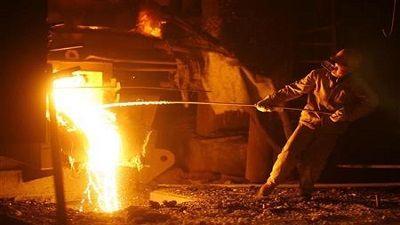The Steel and Engineering Industries Federation of Southern Africa (SERIFS)says it is extremely concerned that the crisis in the local steel industry will continue to worsen this year.
International concern has been sparked by the U.S Commerce Department’s calls for a tariff of at least 53% on all steel imports from 12 countries – including South Africa – which, if accepted could create market distortions.
Australia says it is seeking further clarity on president Donald Trump‘s proposed tariffs. Negotiators trying to rework the NAFTA trade deal were also hit by this prospect that could complicate car making in North America, one of the most sensitive issues at the talks.
Japan says exports of steel and other products are not a threat to U.S. national security.
SEIFSA says this is really a matter of enormous concern. It says the latest developments have the potential of further dampening production in the local steel industry, reducing steel exports to the U.S, squeezing margins and depriving the steel industry of much-needed foreign reserves. Imports of Carbon and Alloy steel wire rod by the U.S from South Africa are valued at an estimated 7.1 million US dollars.
It says the situation is further compounded by a low domestic growth scenario which does not augur well for local steel production. For growth in apparent steel consumption to be sustainable, the overall economy’s GDP has to grow by at least 5 per cent – and the South African economy has not grown at those levels since 2007.
On a recent trip to the U.S. Australian Prime Minister Malcolm Turnbull raised the matter directly with Trump and indicated that there should be exemption for Australian steel and aluminium products.
Australian Minister for Trade, Tourism and Investment, Steven Ciobo, told reporters that he is yet to get “clarity from the administration about whether or not an exemption will be in place for Australia.”
“Now at this point in time, we don’t have clarity from the administration about whether or not an exemption will be in place for Australia, and whether or not this will be a unilateral imposition of tariffs across the board. I’ve put a call through to Secretary Ross, U.S. Commerce Secretary, and have requested for he and I to be able to speak as soon as possible to go through the detail of this announcement. So we will continue to be strong advocates for Australian interests. We will continue to engage with the U.S. administration, not only in terms of the work that we’ve done up until this point but also the work that will come very intensively over the days ahead until such time as we see the detail around the President’s announcement.”
Automakers and other users of the metals are also worried about retaliatory tariffs that might affect their finished products.
Members of the Farmers for Free Trade say the announcement invites retaliation that they are deeply concerned will hurt American farmers.
They say the tariffs are very likely to accelerate a tit-for-tat approach on trade, putting US agricultural exports in the cross-hairs.
“Our systems are so integrated that we would not like to see any impact on the supply, trade we have with Mexico. Like the others here, we do not like to see uncertainty in the market and we believe that the threat of cancellation of that treaty must be removed from the table.” He added Mexico had started to look elsewhere to import grains which was worrying.
Japanese Trade Minister Hiroshige Seko told reporters that Japanese exports of steel and aluminium to the United States posed absolutely no threat to U.S. national security.
Seko noted that Trump had not announced which specific nations were targeted, and other ministers have added that Japan will be monitoring the tariffs measure that is expected to be announced by the White House next week.
SEIFSA CE Kaizer Nyatsumba says although the Federation also called for the imposition of tariffs on some foreign imports into South Africa, it did so only when it believed there was unfair competition as a result of manufacturing subsidies and export incentives, as is the case with some Asian imports.
Nyatsumba has called on the Department of Trade and Industry speedily to engage its US counterpart in a discussion in an effort to resolve this matter.


